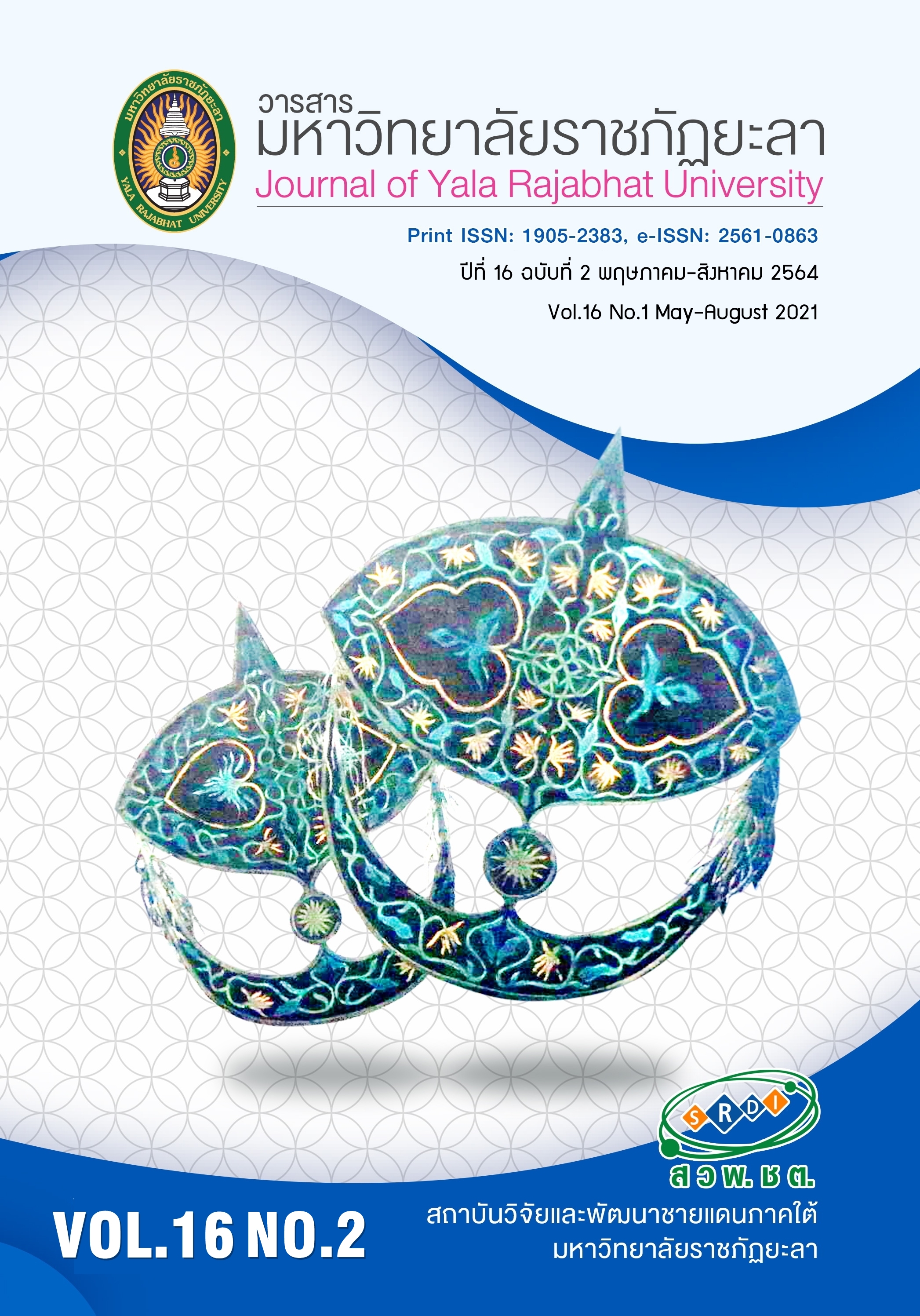ความเข้าใจธรรมชาติของวิทยาศาสตร์ของนักศึกษาฝึกประสบการณ์วิชาชีพครูวิทยาศาสตร์
Main Article Content
บทคัดย่อ
การเรียนรู้ธรรมชาติของวิทยาศาสตร์ของนักศึกษาฝึกประสบการณ์วิชาชีพครูวิทยาศาสตร์ไม่มีรายวิชาเฉพาะ มีเพียงการแทรกเนื้อหาธรรมชาติของวิทยาศาสตร์ในบางรายวิชาของหลักสูตร จึงได้มีการวิจัยเพื่อศึกษาความเข้าใจธรรมชาติของวิทยาศาสตร์ของนักศึกษาฝึกประสบการณ์วิชาชีพครูวิทยาศาสตร์ กลุ่มที่ศึกษาเป็นนักศึกษาฝึกประสบการณ์วิชาชีพครูวิทยาศาสตร์จำนวน 31 คน มหาวิทยาลัยราชภัฏแห่งหนึ่งในภาคใต้ ซึ่งได้มาจากการเลือกแบบเจาะจง และใช้ระเบียบวิธีวิจัยเชิงผสมผสาน เครื่องมือที่ใช้ในการวิจัยเป็นแบบวัดความเข้าใจธรรมชาติของวิทยาศาสตร์ (VNOS-C) พัฒนาโดย Lederman ซึ่งทำการวิเคราะห์ข้อมูลด้วยการวิเคราะห์เชิงเนื้อหา จัดกลุ่มความเข้าใจธรรมชาติของวิทยาศาสตร์ และคำนวณหาค่าความถี่และค่าร้อยละของแต่ละกลุ่มความเข้าใจของกลุ่มที่ศึกษา ผลการวิจัยพบว่า นักศึกษาฝึกประสบการณ์วิชาชีพครูวิทยาศาสตร์ส่วนใหญ่มีความเข้าใจถูกต้องบางส่วนทุกคุณลักษณะธรรมชาติของวิทยาศาสตร์ โดยเฉพาะคุณลักษณะวิทยาศาสตร์ต้องการหลักฐานและคุณลักษณะความคิดสร้างสรรค์และจินตนาการมีผลต่อการสร้างความรู้ทางวิทยาศาสตร์ นอกจากนี้พบว่า นักศึกษาฝึกประสบการณ์วิชาชีพครูวิทยาศาสตร์บางส่วนมีความเข้าใจคลาดเคลื่อนในคุณลักษณะกระบวนการสืบเสาะหาความรู้ทางวิทยาศาสตร์มีความหลากหลาย อย่างไรก็ตามยังพบว่า นักศึกษาฝึกประสบการณ์การณ์วิชาชีพครูวิทยาศาสตร์มีความเข้าใจถูกต้องโดยเฉพาะคุณลักษณะวิทยาศาสตร์ เทคโนโลยี และสังคม มีผลกระทบซึ่งกันและกัน ผลการค้นพบชี้ให้เห็นว่ามีความจำเป็นที่ต้องมีการบูรณาการจัดการเรียนรู้ธรรมชาติของวิทยาศาสตร์ในรายวิชาที่เกี่ยวข้องกับการสอนวิทยาศาสตร์ และการบรรจุรายวิชา ธรรมชาติของวิทยาศาสตร์ ในหลักสูตรของนักศึกษาครูวิทยาศาสตร์ หรือมีการฝึกอบรมเกี่ยวกับธรรมชาติของวิทยาศาสตร์ให้กับนักศึกษาฝึกประสบการณ์วิชาชีพครูวิทยาศาสตร์ เพื่อสามารถนำความรู้ความเข้าใจธรรมชาติของวิทยาศาสตร์บูรณาการการจัดการเรียนการสอนวิทยาศาสตร์ในอนาคตได้
Article Details
บทความ ข้อมูล เนื้อหา รูปภาพ ฯลฯ ที่ได้รับการเผยแพร่ในวารสารมหาวิทยาลัยราชภัฏยะลานี้ ถือเป็นลิขสิทธิ์ของวารสารมหาวิทยาลัยราชภัฏยะลา หากบุคคลหรือหน่วยงานใดต้องการนำทั้งหมดหรือส่วนหนึ่งส่วนใดไปเผยแพร่ต่อหรือกระทำการใดๆ จะต้องได้รับอนุญาตเป็นลายลักษณ์อักษรจากวารสารมหาวิทยาลัยราชภัฏยะลาก่อนเท่านั้น
เอกสารอ้างอิง
Alanazi, F. H. (2018). The viewpoints of preservice science teachers on the essential nature of science concepts in the Saudi context: A triangulation approach. Journal of Baltic science education, 17(4), 688-710.
American Association for the Advancement of Science. (1993). Nature of science. Retrieved August 17, 2020, from http://www.project2061.org/publications/bsl/online/index.php?chapter=1>.
Buaraphan, K. (2018). In-service science teachers’ common understanding of nature of science. OIDA International Journal of Sustainable Development, 6(5), 17-37.
Driver, R., John, L., Robin, M., & Scott, P. (1996). Young people,s images of science. Britstol: Open University press.
Institute of scientific Bureau of academic affairs and educational standards office. (2012). The qualitative research for studying student,s understanding. Bangkok: Thai Aksorn Printing. (in Thai).
Jain, J., Abdullah, N., & Lim, B. K. (2018). The tentativeness of scientific theories: Conceptions of pre-service science teachers. The Malaysian Online Journal of Educational Science, 2(2), 37-44.
Jituafua, A., Pongprapan P., Visetson, S., & Kanchanawarin, C. (2015). Pre-service science teachers, understanding of nature of science and ability to integrate nature of science into teaching. Kasetsart Journal of social sciences, 36, 308-321. (in Thai).
Koksal, M. & Samunen, K. (2014). Advanced science students, understanding on nature of science in Turkey. Asia Pacific Forum on Science Learning and Teaching, 15(1), 1-14.
Ladachart, L. & Ladachart, L. (2016). Pre-service biology teachers’ understandings about nature of scientific Inquiry. Learning Innovations Journal, 2(1), 24-44. (in Thai).
Ladachart, L., Sutthakul, L., & Faikhamta, C. (2013). A Critical difference between the promotion of “Nature of Science” instruction outside and inside Thailand. Kasetsart Journal (Soc. Sci). 34, 269–282. (in Thai).
Lederman, N. G., Abd-El-Khalick, F., Bell, R. L., & Schwartz, R. S. (2002). View of nature of science questionnaire: toward valid and meaningful assessment of learner,s conceptions of nature of science. Journal of Research in Science & Teaching, 39(6), 497-521.
Lederman, N. G. & Lederman, G. S. (2019). Teaching and learning nature of scientific knowledge: Is it Déjà vu all over again. Disciplinary and Interdisciplinary Science Education Research, 1(6), 1-9.
Limpanont, P. P. (2019). A study of understanding of the nature of science and nature of science instruction of pre–service teachers. Journal Research Unit on Science Technology Environment Learning, 10(2), 247-262. (in Thai).
McComas, W. F., Clough, M. P. & Almazroa, H. (2002). The role and character of the nature of science in science education in the nature of science in science education rationales and strategies. Netherlands: Kluwer Academic.
Prachagool, V. & Nuangchalerm, P. (2019). Investigating the nature of science: an empirical report on the teacher development program in Thailand. Jurnal Pendidikan IPA Indonesia, 8(1), 32-38.
Safkolam, R., Khumwong, P., Pruekpramool, C. & Hajisamoh, A. (2019). Science Teachers, Understanding and Teaching of Nature of Science in Islamic Private Schools in Yala Province. Al-Hikmah Journal of Fatoni University, 7(14), 127-140. (in Thai).
Sangsa-ard, R., Thathong, K., & Chapoo, S. (2014). Examining grade 9 students, conceptions of the nature of science. Procedia- Social and Behavioral Sciences, 116, 382-388.
Thiangchanthathip, K. (2016). The development of HI-ER learning model for enhancing scientific conceptions, and the nature of science understanding of 10th grade students. (Doctor,s Thesis) Science Education center, Srinakharinwirot University. (in Thai).
Thanormchayathawat, B., Vanitsuppavong, P., Niemted, W. & Portchanatanti, N. (2016). 21st century skills: a challenge for students development. The Southern College Network Journal of Nursing and Public Health, 3(2), 208-222. (in Thai)
Ozgelen, S., Yilmaz-Tuzun, O., & Hanuscin, D. L. (2013). Exploring the development of preservice science teachers’ views on the nature of science in inquiry-based laboratory instruction. Research in Science Education, 43, 1551-1570.


